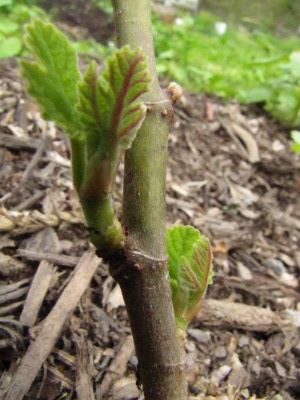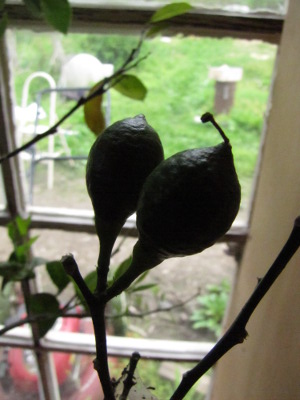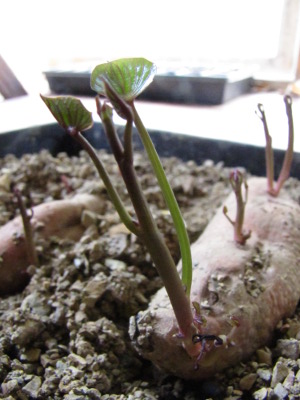
Garden experiments: Winter protection, urine fertilizer, sweet potato propagation
Time for another round
of small experiments in progress!
 Tender
perennial winter protection --- This fall, I tried two different
methods of protecting perennials that are marginally winter hardy in
our region. For
our rosemary, I simply put four cinderblocks around each plant and
filled in the center with autumn leaves. All three of my
rosemaries died, partly because Lucy got obsessed with digging the
biggest one up, but primarily (I'm guessing) because my winter
protection was too slap-dash. On the other hand, the plastic
netting that I wrapped around my hardy fig and filled with leaves
did the job quite well. The only thing I'd change there is to
wait to remove the leaves until mid-April --- I took the protection off
prematurely and the tops of the fig twigs died back.
Tender
perennial winter protection --- This fall, I tried two different
methods of protecting perennials that are marginally winter hardy in
our region. For
our rosemary, I simply put four cinderblocks around each plant and
filled in the center with autumn leaves. All three of my
rosemaries died, partly because Lucy got obsessed with digging the
biggest one up, but primarily (I'm guessing) because my winter
protection was too slap-dash. On the other hand, the plastic
netting that I wrapped around my hardy fig and filled with leaves
did the job quite well. The only thing I'd change there is to
wait to remove the leaves until mid-April --- I took the protection off
prematurely and the tops of the fig twigs died back.
 Feeding house plants with urine
--- I've been watering
our potted dwarf citrus trees with urine for months now --- one cup
per week for the biggest plants, watered down into half a gallon of
liquid, and half a cup (similarly diluted) for the smaller
plants. All I can say is --- wow, what a success! After a
couple of years of giving us six or seven lemons, our dwarf
Meyer lemon is currently decked out in 37 fruits, most of which are
so big there's no chance they'll be aborted, and the tree is blooming
some more. Our younger dwarf citrus plants are also growing like
crazy, although none have fruited yet. Without a control, I can't
promise you that the urine I've been feeding our plants is responsible
for this sudden heavy yield, but I'd definitely recommend the technique
to anyone.
Feeding house plants with urine
--- I've been watering
our potted dwarf citrus trees with urine for months now --- one cup
per week for the biggest plants, watered down into half a gallon of
liquid, and half a cup (similarly diluted) for the smaller
plants. All I can say is --- wow, what a success! After a
couple of years of giving us six or seven lemons, our dwarf
Meyer lemon is currently decked out in 37 fruits, most of which are
so big there's no chance they'll be aborted, and the tree is blooming
some more. Our younger dwarf citrus plants are also growing like
crazy, although none have fruited yet. Without a control, I can't
promise you that the urine I've been feeding our plants is responsible
for this sudden heavy yield, but I'd definitely recommend the technique
to anyone.
 Sweet potato propagation
--- A week ago, I told you that the sweet
potatoes we're propagating in damp gravel on top of a heat mat had started
to sprout. Now there are sprouts shooting up all over, one of
which is nearly big enough to clip and root! I took the clear lid
off the flat so that the shoots can get a bit taller, and expect to be
ready to put sweet potatoes in the ground far sooner than ever
before. This method is definitely a winner and will be our sweet
potato slip production method from here on out.
Sweet potato propagation
--- A week ago, I told you that the sweet
potatoes we're propagating in damp gravel on top of a heat mat had started
to sprout. Now there are sprouts shooting up all over, one of
which is nearly big enough to clip and root! I took the clear lid
off the flat so that the shoots can get a bit taller, and expect to be
ready to put sweet potatoes in the ground far sooner than ever
before. This method is definitely a winner and will be our sweet
potato slip production method from here on out.
Our chicken waterer is an experiment that passed
the test with flying colors. Now we can leave our chickens alone
for a long weekend without worrying about them fouling or spilling the
water.
Want more in-depth information? Browse through our books.
Or explore more posts by date or by subject.
About us: Anna Hess and Mark Hamilton spent over a decade living self-sufficiently in the mountains of Virginia before moving north to start over from scratch in the foothills of Ohio. They've experimented with permaculture, no-till gardening, trailersteading, home-based microbusinesses and much more, writing about their adventures in both blogs and books.
Want to be notified when new comments are posted on this page? Click on the RSS button after you add a comment to subscribe to the comment feed, or simply check the box beside "email replies to me" while writing your comment.

There's two things that I wonder about;
I guess diluting the urine should help with the smell, but in the relatively limited volume of soil available to a houseplant, I wonder if you'd get salt buildup?
In my experience, smell is only a problem if you let the urine sit around for a few days before you use it. If you use it right away, you don't smell anything.
Salts are potentially more troublesome. I'm not concerned for my trees since I put them outside in the summer, so our regular torrential rains flush the soil clean at intervals. Salt buildup could definitely be a problem with a house plant that never goes out, though.